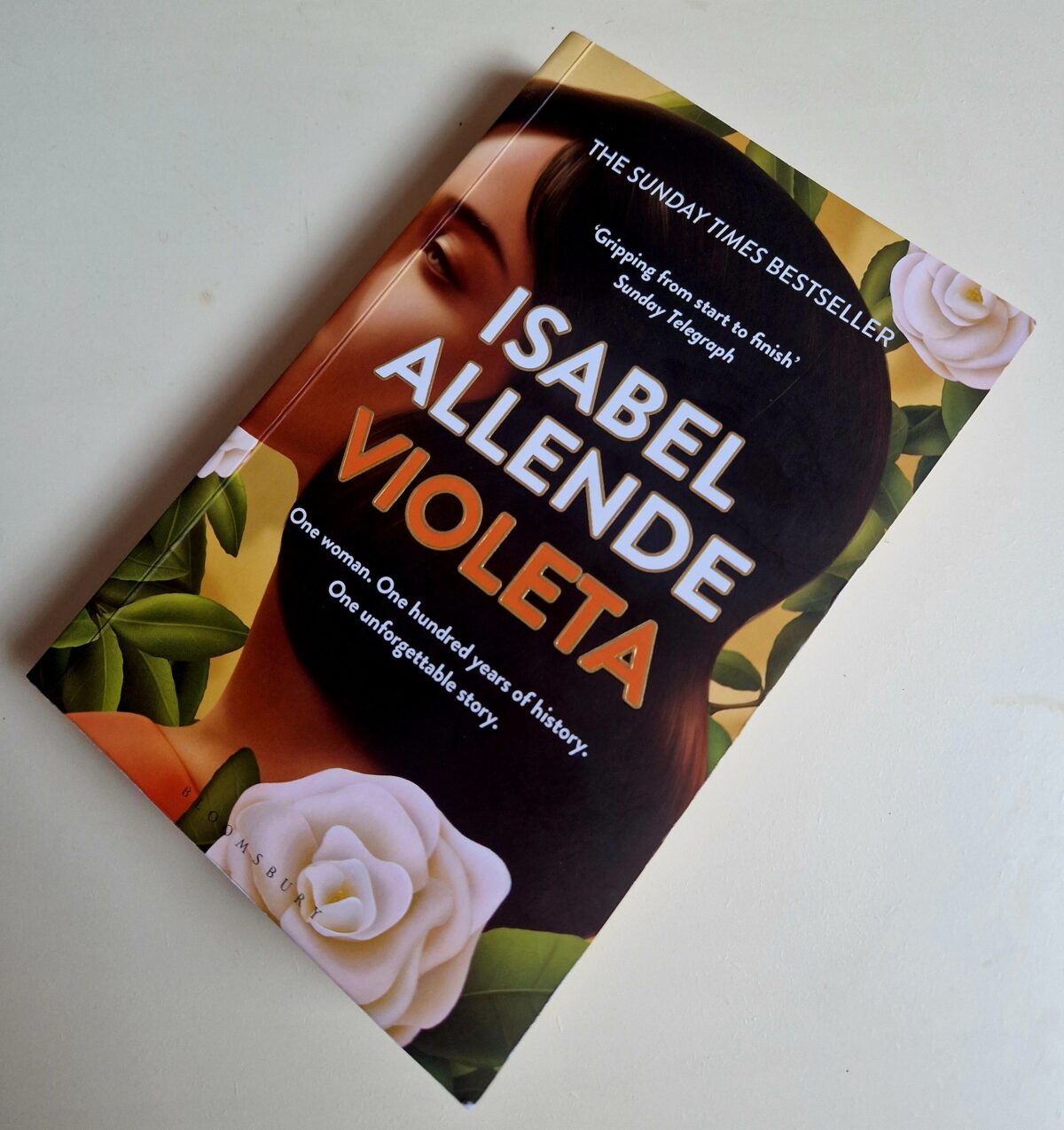by Charlie Hislop.
A new Isabel Allende novel is always something to look forward to, and Violeta is no exception. It is the life story of a 100 year old woman in Chile. Set against a century of the country’s turbulent history, carefully described, its impacts are woven directly into Violeta’s story. The book is narrated by Violeta as a complete chronicle of her life to someone called Camilo, to replace individual letters she has written over the years. It is only halfway through, when he appears in the narrative, that we discover who Camilo is, in relation to her.
Violeta is born into a well-to-do family in 1920, the year that ‘Spanish’ flu ravaged Europe. It reached Chile a couple of years later, and marked the first upheaval in her life. In her youth the family begins to fall apart – her mother’s illness, her father’s poor business sense, eventual tragedy and then a move into ‘exile’ in the rural south, where they are met by new friendships and warmth, becoming established.
As she grows up, Violeta spreads her wings in her new life, joins her brother in business, leaves her husband for a moment of passion that grows into a long term liaison and brings her two children. It would be wrong to go further as the chronicle of her early years develops into a compelling narrative that runs up to the point where she signs off in 2020.
Her story of Chile before and during World War 2 draws on the turbulent economy, the Catholic church, the immigrant German community, the 1960 earthquake. But is from the 1960s onwards that provides the most compelling backdrop and into which her and her family’s lives are most strongly inter-woven.
The story draws upon the radicalisation and role of South American Catholic priests as champions of the poor – the ‘liberation theology’ that has led to rise of the current pope, the first from that continent. It contrasts the role of the Church under the junta in Chile with that of Argentina under the generals. It plays on the role of the CIA in destabilising Chile – the USA’s wouldn’t allow another Cuba in its ‘backyard’, while also highlighting the seeming chaos and polarisation of the country after the election of the socialist government. That polarisation exists across much of South America today – just look at Brazil.
Allende charts the initial sense of order (Violeta is from the upper classes) following the 1973 coup into growing repression, torture and fear that grew under Pinochet’s dictatorship as Violeta and her family members tread their paths through those times, and eventually into the new democratic Chile and the ongoing ‘reveals’ from the darkest periods.
From her mid-60s, Violeta – by now well-off again – begins a new journey into philanthropy and women’s rights stemming from her rural ‘exile’ years and the women she met, the governess from her childhood and her activist partner: relationships she maintains throughout her life.
The best books provide the greatest insights into our understanding of societies and history without giving us a history lesson, and Violeta is certainly that. The magic is the way that Allende has plotted Violeta’s life, the connections she makes, the people and their characters, the places, businesses she creates in such a way to draw in her story of Chile over 100 years.
But then to a large extent, between the lines it is a book that says an awful lot about Isabel Allende, herself. Still writing in Spanish, although she has lived in California for many years, she grew up in a well-established family in Chile. But there any direct comparison with Violeta’s life ends : “One Tuesday…by noon they’d bombed the presidential palace, the president was dead, and the country was under military command. The people I knew applauded from their balconies…”
President Salvador Allende was her father’s cousin. So in reality, Isabel Allende organised safe routes into exile, until she too found herself on the military junta’s ‘wanted’ list and she fled to Venezuela where she lived for over a decade and eventually “became a serious writer”. Previously she was merely a successful playwright, journalist and editor of a national magazine!
Violeta’s rebirth in her 60s led her to set up a charitable foundation for supporting women and campaigning on domestic violence. Allende has always been a strong feminist, and in the USA she has a Foundation dedicated to “supporting programs that promote and preserve the fundamental rights of women and children to be empowered and protected”. She set it up after the death of her daughter in the USA, another link to Violeta, – ah, too many spoilers.
I would recommend Violeta to my political friends, my South American friends, my feminist friends, my thriller friends, or just plain book-reading friends. It is beautifully written and translated – a wonderfully crafted story from start to finish.
Violeta by Isabel Allende is published by Bloomsbury Publishing, rrp £8.99, and is available from October Books in Portswood, Southampton, and other good book shops.
For more information about the author, Isabel Allende and details of other books by her, visit: IsabelAllende.com
- In Common is not for profit. We rely on donations from readers to keep the site running. Could you help to support us for as little as 25p a week? Please help us to carry on offering independent grass roots media. Visit: https://www.patreon.com/incommonsoton

